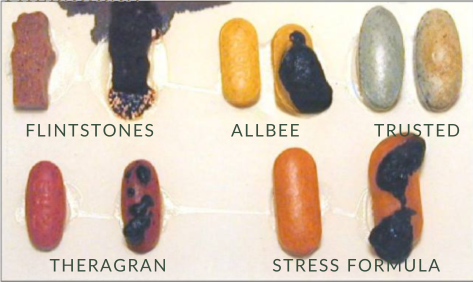Are Budget Supplements a Bargain… or a Risk to Your Health?
Category: Healthy Nutrition

Blog post by Bonnie Smit
Discover the hidden dangers of budget supplements, including absorption issues, nutrient imbalances, and undissolved pills. Learn what to watch out for and why supplement quality matters for your health.
After I had cancer, I got serious about prevention. Like a lot of people, I figured Costco or Walmart vitamins were practical. But then my aunt asked, “Are you sure you’re getting your money’s worth?” That question stuck with me.
Prefer to listen instead? I recorded a short podcast version of this post—you can press play below or find it on Apple & Spotify.
Were those “bargains” actually saving me money—or quietly costing more than I realized?
Quality Risksaffordable supplements
Supplement quality varies wildly—especially with cheaper brands. The industry isn’t well regulated1, which means companies can get away with cutting corners. Many use synthetic nutrients made from petroleum byproducts or industrial solvents like acetone. These ingredients might check a box on the label, but your body doesn’t always recognize them. If your system can’t identify it, it won’t put it to use.
Did you know? X-rays have shown undissolved pills in the digestive tract—including a Mayo Clinic case with 50 undigested pills. Some were even mistaken for gallstones. And yes, some brand names were still readable when pulled from sewage systems.
Absorption Barriershealth risks of budget supplements
Thick coatings, glues, and fillers aren’t just unnecessary—they can stop nutrients from being absorbed. Even if a tablet breaks down in your stomach, that’s no guarantee the contents actually get into your bloodstream1. If your body can’t use what you’re taking, you’re not saving money—you’re flushing it.
Hidden Additiveshidden dangers of cheap vitamins
Cheap doesn’t just mean simple. Many of these formulas contain things you wouldn’t knowingly choose: soy, wheat, shellac, titanium dioxide, or artificial dyes and sweeteners. If you’ve got allergies, sensitivities, or autoimmune issues, that’s a problem.
Heat tests on budget vitamins revealed black residue and discoloration—clear signs of additives and impurities. High-quality supplements stayed clean. Proof that not all vitamins are created equal.
Nutrient Imbalancenutrient imbalance
One common issue in low-cost multivitamins is poor balance. You might see megadoses of B3 or B6—which can actually cause nerve issues in high amounts—but barely any B12 or folate. The body uses nutrients in teams. When you overload some and ignore others, it can throw everything off.
Dosing Dilemmadosing concerns
Nearly 90% of supplements don’t match their label claims2. That’s not a typo. Studies found that major retailers—including GNC, Walmart, Target, and Walgreens—were selling products that didn’t contain what the label promised3.
Centrum contains things like polyethylene glycol and titanium dioxide—both questionable4. Third-party testing shows limited transparency around sourcing and quality.
Contamination Concerns
health risks of budget supplements
Transparency Issuessupplement transparency
The bottom line? You deserve to know what you’re putting into your body. With many budget brands, there’s no third-party testing, no clear sourcing, and no accountability if something’s off.
So… Are Budget Supplements Worth It?
health risks of cheap vitamins
Some things in life can be done on a budget. But when it comes to your supplements, what looks cheap upfront can quietly cost you in the long run. Poor absorption, harmful fillers, or inaccurate dosing—it’s not always worth the gamble.
Curious how the expensive ones stack up? My next blog takes a closer look at expensive supplements—are they actually worth it?
Footnotes
- Consumer Reports. “Supplements Can Make You Sick.” Read More ↩︎
- Halpern L. “Dietary Supplement Labels May Not Indicate All Ingredients in Product.” Pharmacy Times. Published July 2023. Read More ↩︎
- CBS News. “Herbal Supplements Targeted by New York Attorney General.” Read More ↩︎
- Centrum ingredients concern: Read More ↩︎
- “Survey Data on Lead in Women’s and Children’s Vitamins.” Read More ↩︎
- Tucker J, et al. “Unapproved Pharmaceutical Ingredients in Supplements.” Read More ↩︎
Hi, I’m Bonnie. I’m a cancer survivor and special-needs mom who spent years juggling medical appointments, homeschooling, and trying to stay upright. Now I share practical, faith-rooted wellness tools for women worn thin by stress, caregiving, or hard seasons. Most days, I’m still figuring it out—with a mug of coffee in hand.





Facebook Comments